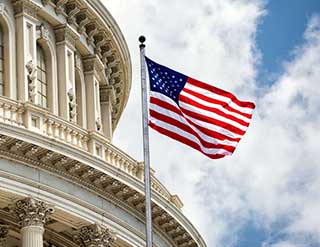Impact of Elections; Federal Aid to Higher Education
President-Elect Biden and the U.S. Secretary of Education
President-Elect Joseph R. Biden Jr. has selected Miguel A. Cardona, Connecticut’s Commissioner of Education and a longtime public-school educator and administrator, as his nominee for U.S. Secretary of Education. Dr. Cardona’s background is largely in elementary and secondary education.
As in the past, much of higher education policy will likely be overseen by the yet-unnamed Under Secretary of Education and the Assistant Secretary for Postsecondary Education.
During the Biden administration, the U.S. Department of Education (USDE) is likely to renew some of the Obama-era department priorities for higher education policy, including a more-significant USDE focus on academic matters at institutions such as what counts as acceptable student outcomes and stricter oversight of for-profit higher education.
Impact of Elections on U.S. Senate
 The election of Raphael Warnock and Jon Ossoff from Georgia to the U.S. Senate means that the Senate will be tied 50-50, with the Vice President as tie breaker, meaning that Democrats effectively will be in the majority. Senator Patty Murray (D-Washington) will likely become the Chair of the Senate Health, Education, Labor and Pensions (HELP) Committee. The HELP Committee will also change to 12 Democrats and 11 Republicans. It is not yet known who will be added to the Committee.
The election of Raphael Warnock and Jon Ossoff from Georgia to the U.S. Senate means that the Senate will be tied 50-50, with the Vice President as tie breaker, meaning that Democrats effectively will be in the majority. Senator Patty Murray (D-Washington) will likely become the Chair of the Senate Health, Education, Labor and Pensions (HELP) Committee. The HELP Committee will also change to 12 Democrats and 11 Republicans. It is not yet known who will be added to the Committee.
With the retirements of outgoing Committee Chair Lamar Alexander (R-Tennessee), Mike Enzi (R-Wyoming) and Pat Roberts (R-Kansas) and the election loss of Kelley Loeffler (R-Georgia), Republicans will have to replace a number of members of the HELP Committee. One Democratic Senator, Doug Jones (D-Alabama), lost his reelection, so Democrats will have to replace at least one member of the Committee and add another member to the Committee.
Senator Murray’s priorities regarding Higher Education Act (HEA) reauthorization during the last Congress included setting standards for institutional outcomes; student achievement standards that apply to all types of institutions; and increased oversight of for-profit conversions to not-for-profit. She has advocated that the HEA prohibit for-profit institution owners from serving on accreditation commissions. She wants to change back the sexual assault hearing process to the Obama-era rules. Also, Senator Murray wants a federal funding match that will help make state colleges free for students.
Department of Education Coronavirus Supplemental Relief Legislation
The Department of Education Coronavirus Supplemental relief bill, approved December 21, 2020, provides $22.7 billion for the Higher Education Emergency Relief Fund (HEERF), including:
- $20.2 billion for nonprofit colleges and their students.
- $1.7 billion for Historically Black Colleges and Universities, Minority Serving Institutions and tribal colleges.
- $113 million for Institutions of Higher Education with the greatest unmet need.
- $681 million for financial aid for students at for-profit colleges.
Permissible uses of these funds include lost revenue, expense reimbursement and technology costs due to online learning and aid for students. Institutions may not use the funds for recruitment, athletics, religious instruction or senior administrator compensation.
The Office of Postsecondary Education webpage (updated on January 5, 2021) states:
January 5, 2021: The Coronavirus Response and Relief Supplemental Appropriations Act, 2021, enacted on December 27, 2020, provided $22.7 billion for institutions of higher education. Information regarding the distribution of these funds is forthcoming and will be posted on this website when available.
National Advisory Committee on Institutional Quality and Integrity in February 2021
 The next meeting of the National Advisory Committee on Institutional Quality and Integrity (NACIQI) is scheduled as a virtual meeting on February 24-25, 2021. An agenda for the meeting, as well as staff reports on accrediting organizations being reviewed, will be posted prior to the meeting.
The next meeting of the National Advisory Committee on Institutional Quality and Integrity (NACIQI) is scheduled as a virtual meeting on February 24-25, 2021. An agenda for the meeting, as well as staff reports on accrediting organizations being reviewed, will be posted prior to the meeting.
NACIQI is the advisory body that provides recommendations to the Secretary of Education on recognition of accrediting organizations. Recognition by USDE affirms that the standards and processes of accrediting organizations are compliant with USDE’s criteria.
The annual Federal Register Note of Membership for NACIQI was published on January 6, 2021.
Members appointed by the Secretary of Education, with terms expiring September 30, 2025, are:
- Ronnie L. Booth, President Emeritus, Tri-County Technical College, Anderson, South Carolina.
- Wallace E. Boston, President Emeritus, American Public University System, Inc., Charles Town, West Virginia.
- Amanda Delekta, Student, Michigan State University College of Law, East Lansing, Michigan.
- David A. Eubanks, Assistant Vice President for Assessment and Institutional Effectiveness, Furman University, Greenville, South Carolina.
- D. Michael Lindsay, President, Gordon College, Wenham, Massachusetts.
- Mary Ellen Petrisko, Former President, WASC Senior College and University Commission, Pittsburgh, Pennsylvania.
Members appointed by the Speaker of the House of Representatives, with terms expiring September 30, 2026, are:
- Kathleen Sullivan Alioto, Strategic Advisor, Fundraiser, and Consultant, New York, New York, San Francisco, California, and Boston, Massachusetts.
- Roslyn Clark Artis, President, Benedict College, Columbia, South Carolina.
- Jennifer Blum, Principal, Blum Higher Education Advising, PLLC, Washington, DC.
- Arthur E. Keiser, Chancellor, Keiser University, Fort Lauderdale, Florida.
- Robert Mayes, Jr., CEO, Columbia Southern Education Group, Elberta, Alabama.
- Robert Shireman, Director of Higher Education Excellence and Senior Fellow, The Century Foundation, Berkeley, California.
Members appointed by the President Pro Tempore of the Senate, with terms expiring September 30, 2022, are:
- Jill Derby, Senior Consultant, Association of Governing Boards of Universities and Colleges, Gardnerville, Nevada.
- Paul J. LeBlanc, President, Southern New Hampshire University, Manchester, New Hampshire.
- Anne D. Neal, President, National Association for Olmsted Parks, Washington, DC.
- Richard F. O’Donnell, Founder and CEO, Skills Fund, Austin, Texas.
- Claude O. Pressnell Jr, President, Tennessee Independent Colleges and Universities Association, Nashville, Tennessee.
- Steven Van Ausdle, President Emeritus, Walla Walla Community College, Walla Walla, Washington.
Secretary of Education Betsy DeVos ResignsOn January 7, 2021, Secretary of Education Betsy DeVos resigned effective January 8. A copy of her letter of resignation can be found here.
The Council for Higher Education Accreditation (CHEA) will continue to closely follow issues related to USDE and Congress and will keep members and the accreditation community informed on issues related to higher education accreditation.****

